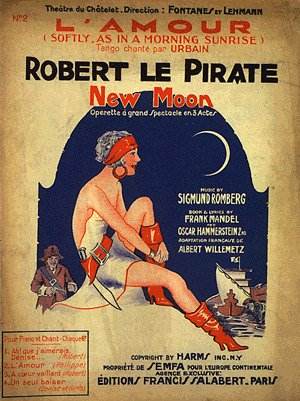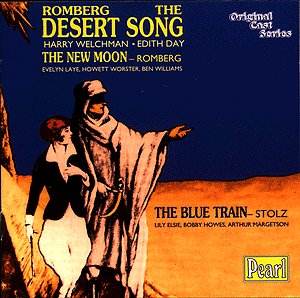The Desert Song, written two years later,
with libretto by Hammerstein II, Harbach and Mandel, had a good cast
and so much good music, colour and romance that it was destined to match
the popularity enjoyed by The Student Prince. Within six months
it was also playing in London at Drury Lane where these recordings were
made. Some fine melodies, skilfully orchestrated by Gerstenberger, capitalised
as fully as possible on the exoticism of a French North African colony.
The operetta is set in North Africa in the '20s against
a background of discontent between the French colonials and local guerrillas,
"The Riffs". A 'Valentino style' love story takes place between a French
commander's daughter, Margot, and the Riff leader, Red Shadow (whose
face nobody has seen). The score, with its brilliant tunes and rhythms,
reflects the confidence gained by Romberg from the success of The
Student Prince. All its favourite songs are here in these Columbia
78s transcriptions.
 The
New Moon, written shortly after Desert Song with libretto
by Hammerstein II, Mandel and Schwab, opened in New York in 1928 (and
in London in 1929). The musical numbers boasted more popularity than
The Desert Song and are probably the best remembered of Broadway.
This was helped by the existence of a film version. Ganzl in his book
"Musicals" tells us that this popularity is surprising because
each of the songs was a replacement, found necessary when the producer
tried out a Philadelphia run prior to Broadway.
The
New Moon, written shortly after Desert Song with libretto
by Hammerstein II, Mandel and Schwab, opened in New York in 1928 (and
in London in 1929). The musical numbers boasted more popularity than
The Desert Song and are probably the best remembered of Broadway.
This was helped by the existence of a film version. Ganzl in his book
"Musicals" tells us that this popularity is surprising because
each of the songs was a replacement, found necessary when the producer
tried out a Philadelphia run prior to Broadway.
Set in the 18th Century in New Orleans,
the well-crafted script concerns a murderer (a French aristocrat) who
escapes justice by disguising himself as a bonded servant sold into
the service of a local landowner. He is in love with his master's daughter
yet since a French detective is pursuing him he dares not declare it.
The French revolution is now in progress and the detective (himself
an aristocrat) is whisked away, so the need for a disguise is now unnecessary.
Packed with good music The New Moon is representative
of the best of many 1920s scores and the Pearl CD notes remind us that
it deserves to be revived more often. Their selection is an interesting
one because it bridges the transition between traditional European romantic
voices and the snappier transatlantic style: these led to the jazzier
approach of Kern and Porter, which commenced with Showboat and
its kind.
Austrian, Robert Stolz, studied with Humperdinck
of Hansel and Gretel fame in Berlin. Like Romberg he was also
associated with the Theater an der Wien and produced his own work there,
Die Lustigen Weiber von Wien in 1909. He was a conductor
and composer of popular ballads as well as an occasional composer of
film scores. Although an Austrian he abhorred Hitler's politics and
left for America in disgust in 1938. He made his feelings known by composing
a Funeral March for Adolf Hitler while Hitler was still alive.
As a prolific composer of operettas, Stolz's The
Blue Train is not well known. With libretto by Titheradge and
Arkell the plot is trivial. It concerns a broken engagement that fiancée,
Eileen, hopes to restore. This is achieved by asking to be married for
only one month (by which time she hopes to renew his affections). The
'Blue Train' is a stage mechanism for transporting the couple first
to a Swiss ski resort and then on to the Rivera where comic sub-plots
take place.
The show was not gauged a success with only 116 performances,
and one asks why Columbia rushed in to record its music? It seems that
Lily Elsie, its main star, was popular with the British public and would
sell records since she had previously created the star part in The
Merry Widow back in 1907.
In general the singers exhibit something of the 'flutter
vibrato' which was fashionable during this period. Edith Day has a lovely
voice with clean top notes and much clarity of diction, yet this is
marred by noisy intakes of breath. Gene Gerrard has an intimate appeal
whilst Harry Welchman at times comes across as a bit aloof with his
RADA diction. He is best in One Alone (tk8). Those who know of
Derek Oldham will understand what I'm talking about.
A few of the records are not in ideal condition: the
Desert Song record suffers from some high frequency worn-groove
distortion.
The pit orchestras are not unduly recessed in the recording
and play reasonably competently. But the opening of Riding Song of
the Riffs sounds distinctly odd and a new wax should have been cut:
in the introduction the wind section is not in tune and it sounds as
if only a solo cello is present.
In New Moon the new electric xylophone (at least
that is what I think it is) makes a prominent appearance but castanets
are almost lost in the recording. The brilliance in Evelyn Laye's voice
comes clearly across and it is likely she had great stage presence (tk10).
Her breezy phrasing is elegant and this suits her character. Ben Williams
has a wide range and strong voice with good breath control, but long-held
notes can waver at times. Howett Worster has a warm resonant tone with
clear diction (tk13).
In the first Blue Train record the orchestra
is disappointingly masked by the singers to a large extent. The balance
is better judged in the following numbers. Delightful singing is provided
by Lily Elsie who, here must have been getting past her best: this recording
was made twenty-five years after her star appearance in The Merry
Widow. Arthur Margetson sings with a certain magnetic presence,
but also has problems when pitching sustained notes: it is a pity that
Elsie couldn't have been provided with a more confident partner. Bobby
Howes sings with confidence and gives us a sample of the change of musical
style in America that was now penetrating London's West End (tk17).
He sings with an appropriate jazzy bounce.


